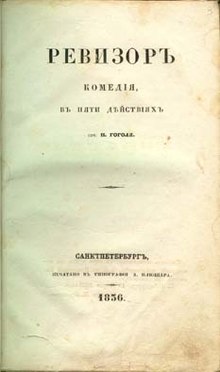
Back المفتش العام (مسرحية) Arabic المفتش العام ARZ Рэвізор (камэдыя) BE-X-OLD Ревизор (комедия) Bulgarian Revizor (Gogol) Czech Yr Archwiliwr Welsh Revisoren Danish Der Revisor German Ο επιθεωρητής Greek La Revizoro Esperanto
This article needs additional citations for verification. (November 2012) |
| The Government Inspector | |
|---|---|
 Cover of the first edition, with archaic spelling Ревизоръ | |
| Written by | Nikolai Gogol |
| Date premiered | 1 May 1836 |
| Place premiered | Alexandrinsky Theatre, St. Petersburg, Russia |
| Original language | Russian |
| Genre | Comedy |
The Government Inspector, also known as The Inspector General (Russian: Ревизор, romanized: Revizor, literally: "Inspector"), is a satirical play by Russian dramatist and novelist Nikolai Gogol.[1] Originally published in 1836, the play was revised for an 1842 edition. Based upon an anecdote allegedly recounted to Gogol by Pushkin,[2] the play is a comedy of errors, satirizing human greed, stupidity, and the political corruption of contemporary Russia.
The dream-like scenes of the play, often mirroring each other, whirl in the endless vertigo of self-deception around the main character, Khlestakov (rendered in some English translations as Hlestakov), who personifies irresponsibility, light-mindedness, and absence of measure. "He is full of meaningless movement and meaningless fermentation incarnate, on a foundation of placidly ambitious inferiority" (D. S. Mirsky). The publication of the play led to a great outcry in the reactionary press. It took the personal intervention of Tsar Nicholas I to have the play staged, with Mikhail Shchepkin taking the role of the Mayor. Nicholas I was personally present at the play's premiere on the stage of the Alexandrinsky Theatre in St. Petersburg on April 19, 1836, concluding that "there is nothing sinister in the comedy, as it is only a cheerful mockery of bad provincial officials."[3]
According to D. S. Mirsky, The Government Inspector "is not only supreme in character and dialogue – it is one of the few Russian plays constructed with unerring art from beginning to end. The great originality of its plan consisted in the absence of all love interest and of sympathetic characters. The latter feature was deeply resented by Gogol's enemies, and as a satire the play gained immensely from it. There is not a wrong word or intonation from beginning to end, and the comic tension is of a quality that even Gogol did not always have at his beck and call."[4] In 2014, the play was ranked by The Daily Telegraph as one of the 15 greatest ever written.[5]
- ^ "Nikolay Gogol". Encyclopædia Britannica. Retrieved 31 December 2010.
- ^ Ehre, Milton (1980). Notes for the Theater of Nikolay Gogol. University of Chicago Press. ISBN 0-226-30066-8.
- ^ Очень нервный вечер. Как Николай I и Гоголь постановку «Ревизора» смотрели
- ^ D. S. Mirsky. A History of Russian Literature. Northwestern University Press, 1999. ISBN 0-8101-1679-0. p. 161. (Public domain.)
- ^ "Best plays of all time". The Daily Telegraph. 2014-04-28. ISSN 0307-1235. Retrieved 2020-04-14.